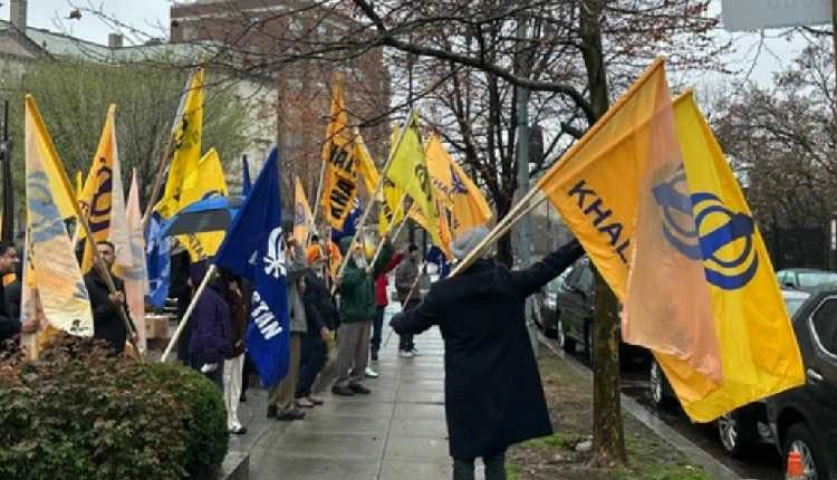

India has been urging Canada to curb Khalistani activities on its soil
Will Canada’s allegations against India claiming that New Delhi was behind the killing of Hardeep Singh Nijjar, a Canadian citizen and chief of the banned Khalistan Tiger Force (KTF) followed by a standing ovation for Yaroslav Hunka, who was part of the Nazi unit during the World War II, deepen the divide between the Global South and the North?
After the initial muted response from Canada’s allies, support for Ottawa is beginning to build.
“There’s not some special exemption you get for actions like this. Regardless of the country, we will stand up and defend our basic principles and we will also consult closely with allies like Canada as they pursue their law enforcement and diplomatic process, he said in response to a question,” US’ National Security Advisor Jake Sullivan told media-persons.
Australia too expressed its concerns over Ottawa’s “serious allegations.”
India has received support from the South Asian bloc.
Sri Lanka’s Foreign Minister Ali Sabry in an interview to news agency ANI said that Canada has been a safe haven for terrorists.
“Some of the terrorists have found safe haven in Canada. The Canadian PM has this way of just coming out with some outrageous allegations without any supporting proof. The same thing they did for Sri Lanka, a terrible, total lie about saying that Sri Lanka had a genocide. Everybody knows there was no genocide in our country,” Sabry said.
Bangladesh newspapers too have come out in support of India.
It is not a secret that Noor Chowdhury, who admitted to have assassinated Bangladesh’s first President Sheikh Mujibur Rahman, popularly known as Bangabandhu continues to live in Canada. Despite Dhaka seeking Chowdhury’s extradition, Canada has turned a blind eye.
Senior journalist, political analyst and author Syed Badrul Ahsan in an article published by Dhaka Tribune noted that from the Bangladesh perspective, despite Ottawa’s insistence on the rule of law, the Canadian authorities have sheltered a convicted assassin of Bangabandhu in their country for decades and have refused to extradite him on the ground that capital punishment is in force in Dhaka.
“But one might as well ask the Canadian authorities that when they were aware of the antecedents of this man, that he had actively been involved in the murder of Bangladesh’s founding father and his family, how was he allowed into Canada and how is it that no legal action has ever been taken against him?” Ahsan questioned.
India, in a statement called out Canada for providing safe haven to terrorists. “We would want the Canadian government to not provide safe havens to terrorists and to take action against those who are facing terrorism charges or send them here to face charges,” Ministry of External Affairs (MEA) spokesperson Arindam Bagchi said at a media briefing.
“If you talk about reputational damage, it is Canada that needs to look at its growing reputation as a place, as a safe haven for terrorists, for extremists, and for organized crime,” Bagchi said.
Fraser Institute, a Canadian public policy think tank in a report published as early as 2006 said that despite Ottawa’s measures to curtail terrorism, there was widespread evidence that the federal government lacked seriousness in taking effective measures in a number of areas. “One of the most obvious is its reluctance to ban certain terrorist groups,” it said.
PBS Frontline put out an interview of Bill Bauer, former member of the Canadian Immigration and Refugee Board in which he acknowledged the problem. “I don’t think it is a deliberate policy on the part of Canada. I think it is the result of a series of shortcomings in the system that enables people to slip across the border through any port of entry, establish a case — particularly those who wish to make a refugee claim — and then more or less disappear forever, in some cases, or in some cases until the hearing, or until they are turned down, or until they are accepted,” he said.
Ahmed Ressam, an Algerian al-Qaeda member, convicted on multiple charges, including act of terrorism — in 2001 he planned to bomb the Los Angeles International Airport, found shelter in Canada.
And now with Ottawa honouring Hunka, an infuriated Russia is set to seek an explanation from Canada.
Even as Canadian Prime Minister Justin Trudeau has apologised for honouring the 98 year old Hunka, a fresh controversy has stirred up.
“This is something that is deeply embarrassing to the parliament of Canada and by extension to all Canadians,” Trudeau said.
The incident happened in front of Ukrainian President Volodymyr Zelensky. Zelensky was also present in the Canadian Parliament.
“Somewhere the line between the Global South and the Global North is becoming distinct with Canada’s actions,” a foreign policy watcher said.
Also read: After Trudeau’s unsubstantiated attack, India has a chance to rebuff bullying by the Anglosphere
The Border Security Force (BSF) Director General Daljit Chawdhary on Friday met with Union Home…
By Shailesh Yadav Google Gemini, the generative artificial intelligence tool of technology major Google, can…
Union Home Minister Amit Shah spoke with Chief Ministers on Friday and asked them to…
Raja Abid, Chairman of the Revolutionary Students Organisation, has condemned the deteriorating education system in…
Tibetans-in-exile in Shimla observed the 36th birthday of the 11th Panchen Lama, Gendhun Choekyi Nyima,…
Leaders of the Baloch Yakjehti Committee (BYC), currently held in Huda Jail in Quetta, have…